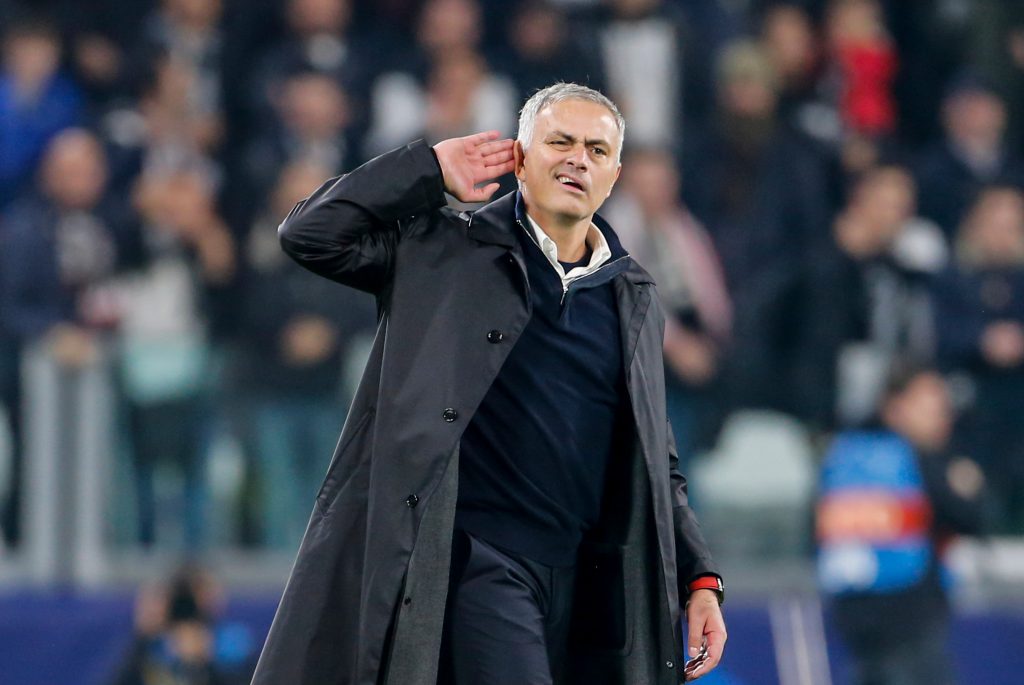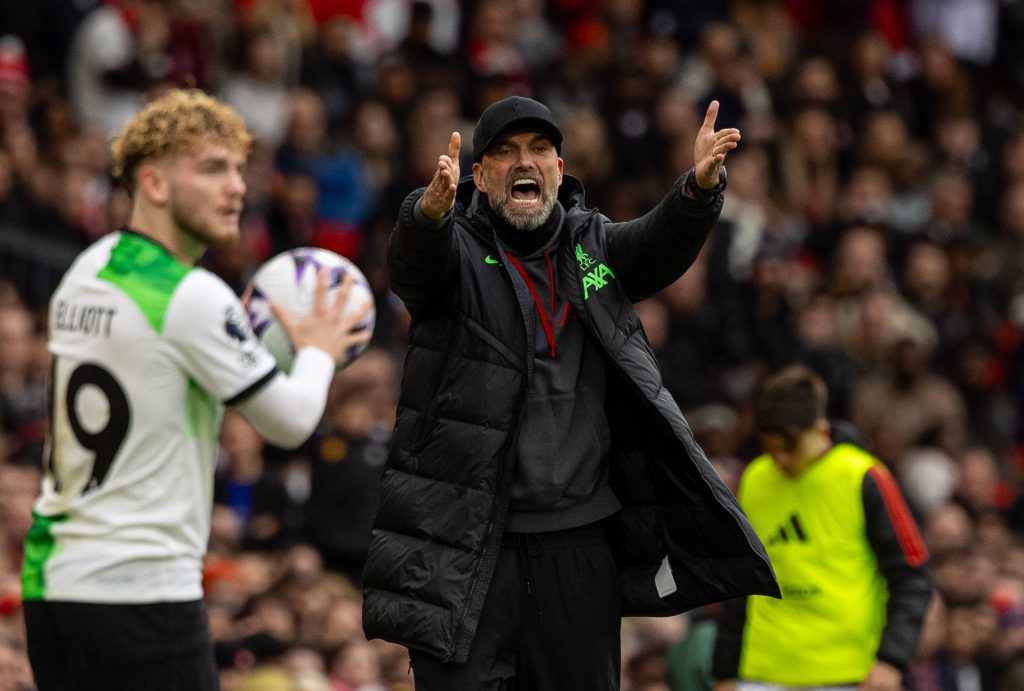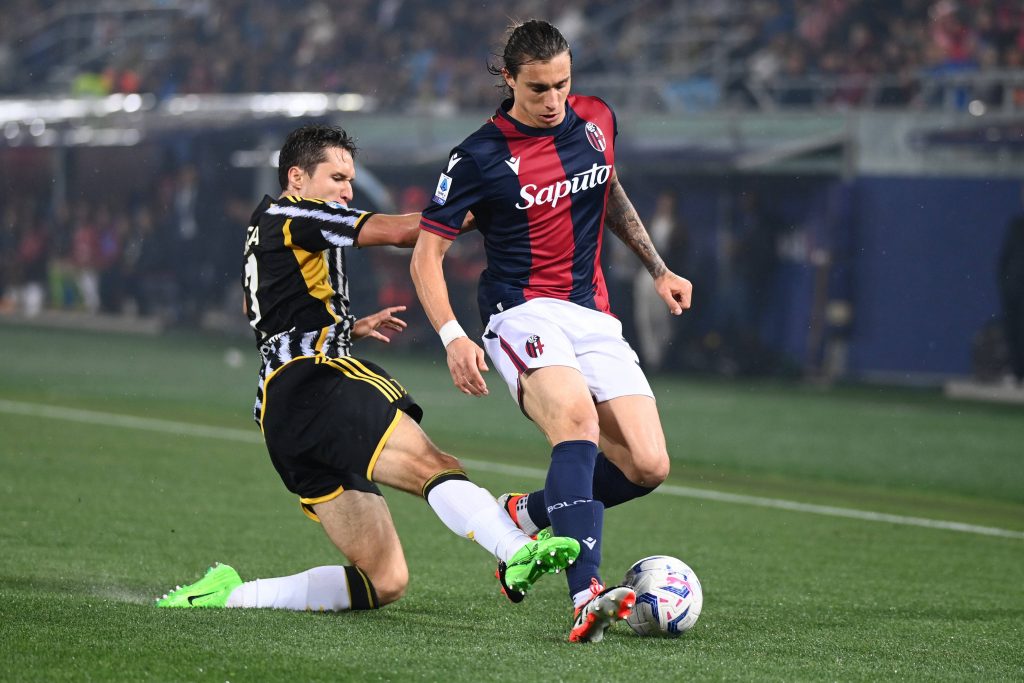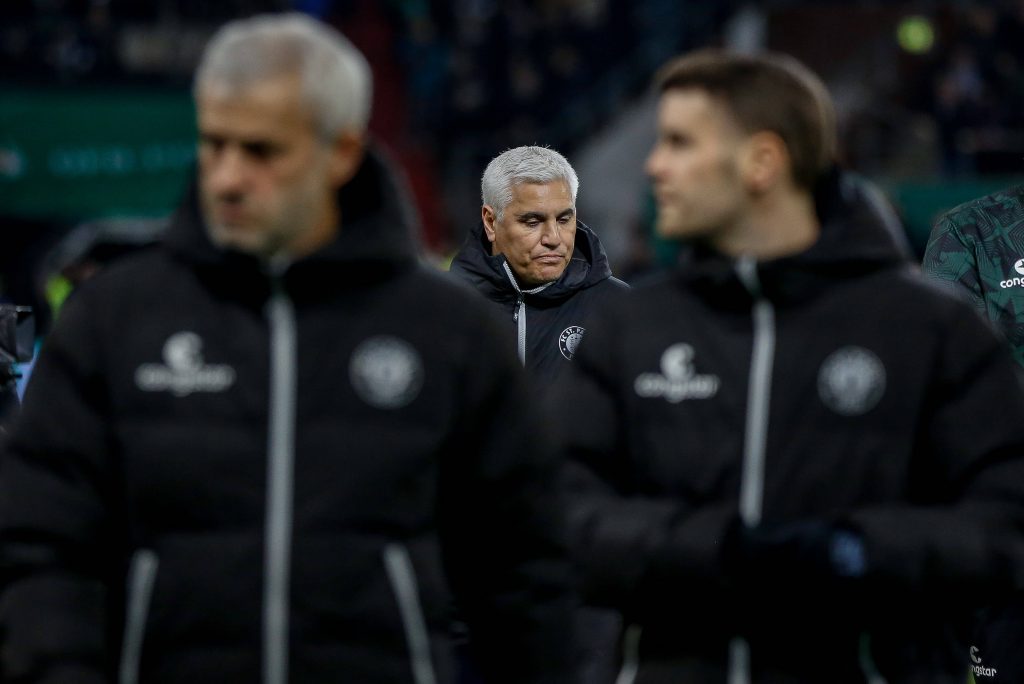Alex Farnell looks at the impact that sacking a manager can have on a team’s performance and attempts to debunk some of the myths about ‘new manager bounce’.
By the time the final whistle blows in many professional football matches, you wouldn’t be too surprised to hear disgruntled fans calling for the manager to be sacked. This is understandable. Fans want to see change and live under the impression that someone else would come in and turn their club’s fortunes around.
In theory, there are plenty of reasons to be hopeful if your team decides that it’s time for a change. Club owners should have a lot of information available to them when picking a new coach. They can observe a coach’s past performances and past successes, and so should have an adequate amount of data to help them make an informed choice about the best candidate.
Evidence outside of sports would support this; hiring a good boss is key to a company’s success. Good bosses motivate their workforce and help the entire organization to become more productive.
But there are also plenty of reasons to be fearful when a club makes a change. Not least because there is no guarantee that a coach’s previous successes will translate into success somewhere else.
Perhaps more worryingly, Finnish economist Marko Terviö has argued—and it has been confirmed to be the case in English football by Thomas Peeters and Stefan Szymanski—that teams have an incentive to hire experienced but ability-wise pretty average coaches, rather than going for an inexperienced, yet possibly very able coach.
Why? Because a coach’s ability is unknown until they have had a job so it is less risky to employ experienced coaches of known ability. That’s why the same coaches just get recycled between teams and fans are left to ponder over yet more mediocrity.
So, what is the actual effect of changing a coach?
Well, the general consensus from previous work on this topic is that they don’t really make that much, if any, difference to team performance. Any positive effects tend to be limited to the first couple of games, referred to as the ‘motivational bump,’ when players will be keen to impress their new boss.
But this effect is on average. In a brand new study on this topic, we used 15 seasons of data (spanning 2000/01 – 2014/15) from the top two levels of football in France, Italy, Germany and Spain to re-assess the question of whether coaches matter.
A quick spoiler: don’t worry if you support a team who has just appointed a new coach with the hope of turning your season around, you just better hope they made the ‘right’ appointment.
Methodological Considerations
Unfortunately, trying to estimate the effect of changing a coach is not a straightforward task. We can’t randomly say to clubs to change their boss.
Instead, coaching changes happen for a reason—usually poor performance (check out the chart below, showing average points per game before and after a sacking)—meaning we can’t simply compare teams who do change their manager with teams who don’t.

With some statistical trickery, however, we can try to mimic randomness. We used a technique called entropy balancing, whereby we search for teams that experience similar runs of form or performance and compare those ending in coach dismissals (or quits) with those resulting in the coach remaining in the job. That way, we are now comparing like for like.
Of course, performance isn’t the only determinant of coaches leaving in the first place. As in previous work, we also adjust for differing team expectations. Poor performance at, say Manchester United is different to poor performance at West Bromwich Albion, which will influence when the coach is likely to be dismissed in the first place.
To control for this, we make use of betting odds as a proxy for team expectations. If actual performance lies below bookmaker predictions, then the team is performing below expectations and the coach will likely be given the boot. Most sackings do indeed follow runs of below-expected performance, but not all. Antonio Conte at Arezzo and Fabio Capello at Real Madrid are a couple of notable examples.
We also include variables that capture a coach’s characteristics. Years of experience, for example, provide some protective effect against dismissals. Presumably, this is because owners feel they have the ability to turn things around in the face of bad performance.
The Findings
So what do our results say?
Well, like other authors, we find that a new coach tends to make little difference to team performance at least on average. But this doesn’t mean that coaches don’t matter at all. Remember that this is an average effect, so within that, some teams will indeed see no change to performance, some will see their performance decline, while other teams will see improvements in their performance.
Which teams stood out? The size of our data allows us to recover team-specific effects. The five best performing teams after changing a coach are Unterhaching (GER), Verona (ITA), Creteil (FRA), Eintracht Frankfurt (GER) and Werder Bremen (GER). The five worst performing teams—those seemingly not so good at picking new bosses—were La Coruna (ESP), Salernitana (ITA), Borussia Dortmund (GER), Amiens (FRA) and Cottbus (GER).
Why bother making a change if it appears to make no difference? It is that small chance of an improvement in performance that motivates team owners to make a change in the first place. Much in the same way that if someone was to play the lottery, they are attracted by that very small (but non zero) chance of winning big.
In our study, we looked at the circumstances within which we are likely to see a positive effect. We first focused our attention on teams who decide to stick with their new coach for 20 games after appointment. Incidentally, a lot of new coaches, particularly in Italy and to an extent Spain, don’t even last this long.
By considering these teams, we presumably are observing cases where teams are happy with their new appointment (or else they’d just sack again). Indeed, we see performance gains of up to 0.1 points per game over a 20 game spell. This may not sound much but so often we see teams avoiding relegation or making a European competition by just a point so it could prove to be crucial. The chart below highlights the points per game evolution for these teams up to 20 games after a change.
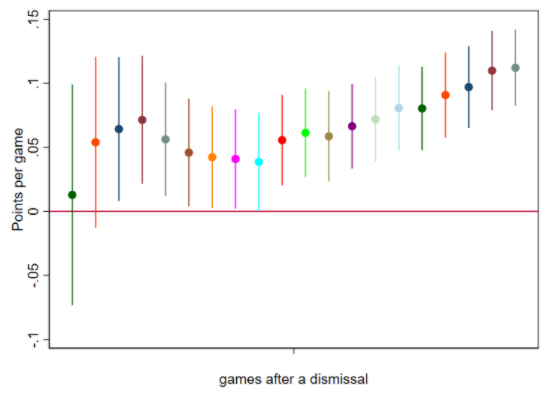
That’s not to say sticking with the coach regardless is a good strategy—far from it—but we believe this result highlights the importance of teams getting the hire right in the first place and of finding a coach who is a good ‘fit’ for the club. Based on this work, however, the definition of the ‘right’ hire would be pure speculation.
As a second check, we looked at differences between coaches who were fired during the season and coaches who were replaced during the off-season. Teams who replace their coach mid-season are unlikely to experience any positive effects (again, this is on average). In fact, our results suggest that, if anything, performance actually declines.
By contrast, changing a coach during the off-season results in fairly sizeable positive effects of up to 0.13 points per game. This is not too surprising if we consider that these new coaches will be able to work with their new squad without the pressures of competitive fixtures and who will be able to recruit new players who are perhaps better suited to their play style. These are luxuries that are not afforded to coaches appointed mid-season.
Conclusion
Even though there are reasons to believe that a change of head coach might lead to improved performance, evidence suggests that, on average, new appointments make little difference.
With that said, there are circumstances where the appointment of a new coach can lead to improvements in performance. Teams should take time to find the ‘right’ coach. This may involve a thorough interview process before appointment to ensure the right hire is made—how often do we see a new coach appointed seemingly before the old one is sacked! This process may also help them uncover an untried, but up-and-coming young coach, rather than going for an experienced but unspectacular option.
And if possible, coaching changes should be delayed until the offseason, since this is likely to result in greater success when coaches have more time to implement any desired changes.
In defence of clubs appointing a new coach, though, it may be hard to distinguish between who is actually a good coach and who is just average. Initial correlational analysis (I’m not claiming anything about causality here) suggests hiring an internal candidate may be beneficial, as may be hiring a coach with a defensive background.
We’ll be speaking to Alex about his research in next month’s Analytics FC Podcast episode. You can find all of the previous episodes of the podcast over on our website.
Header image copyright cristiano barni / Shutterstock.com

